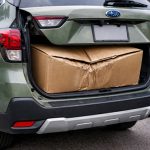
Subaru has decided that a safety defect could affect certain 2026 Subaru Forester vehicles. According to Subaru, some vehicles were built with an incorrect or improperly oriented rear gate stay bracket, which could cause the rear hatch support stay to suddenly detach — without any warning to the driver or passengers.
What Is the Defect?
The problem involves the rear gate stay bracket, a component that helps support the rear hatch when it is open. Affected vehicles may have:
- An incorrect rear gate stay bracket, or
- A bracket that was installed in the wrong orientation
Either condition can cause the rear gate stay to detach unexpectedly during use.
Why This Is Dangerous
If the rear gate stay detaches without warning, the rear hatch can suddenly lose support. This creates a serious risk of:
- Head and upper-body injuries
- Crush injuries to hands or arms
- Potential injuries to children, passengers, or anyone loading cargo
How Subaru Discovered the Problem
- October 28, 2025: During in-process inspection, Subaru found a vehicle built with an incorrect rear gate stay bracket.
- Additional inspections revealed more vehicles with either:
- Incorrect brackets, or
- Brackets installed backwards or in the wrong orientation.
- October 29 – December 10, 2025: Subaru launched a formal investigation and conducted repeated open/close cycle testing.
- While initial tests did not show failures, Subaru concluded that longer-term real-world use could lead to stay detachment without warning.
- December 11, 2025: Out of caution, Subaru decided to issue a safety recall.
Subaru admitted the root cause was a faulty work instruction process that failed to ensure the correct bracket was installed in the proper orientation.
Vehicles Affected
- Model: 2026 Subaru Forester
- Recall Number: WRG-25
- NHTSA Campaign Number: 25V-889
- Owner Notification Letters: Expected to be mailed February 16, 2026
What Will Dealers Do?
Subaru dealerships will:
- Inspect the rear hatch support bracket
- Replace the rear gate stay and support bracket if any defect or mis-installation is found
Repairs are expected to be performed at no cost to owners.
What This Means for Lemon Law Claims
Even though Subaru says no injuries have occurred, this defect involves a safety-critical system and was serious enough to justify a federal recall.
You may have a valid Lemon Law claim if:
- Your vehicle experiences repeat repair attempts
- The rear hatch detaches or becomes unsafe
- Your vehicle is out of service for an extended period
- The defect substantially impairs the use, value, or safety of your Forester
Lemon laws protect consumers when manufacturers are unable to permanently fix serious safety defects within a reasonable number of attempts.
What Owners Should Do Now
- Watch for Subaru’s recall letter in mid-February 2026
- Schedule your inspection as soon as possible
- Keep all repair orders and service records
- If problems continue after repair, contact a Lemon Law attorney immediately
Final Thoughts
The 2026 Subaru Forester rear hatch recall highlights how even a small manufacturing error can create a serious safety hazard. A rear gate stay that detaches without warning is not a minor inconvenience — it is a potential injury-causing defect.
If your Forester has this issue and Subaru cannot repair it properly, your vehicle may qualify as a lemon.





